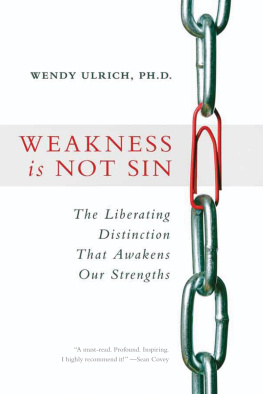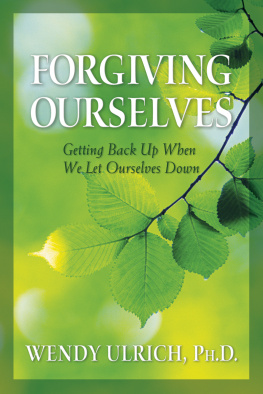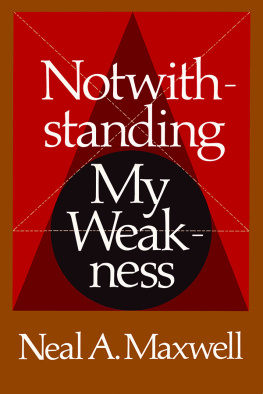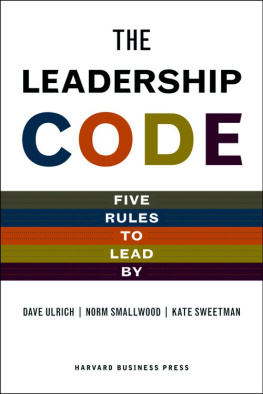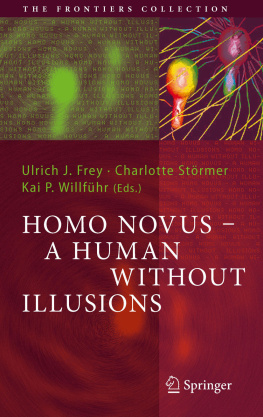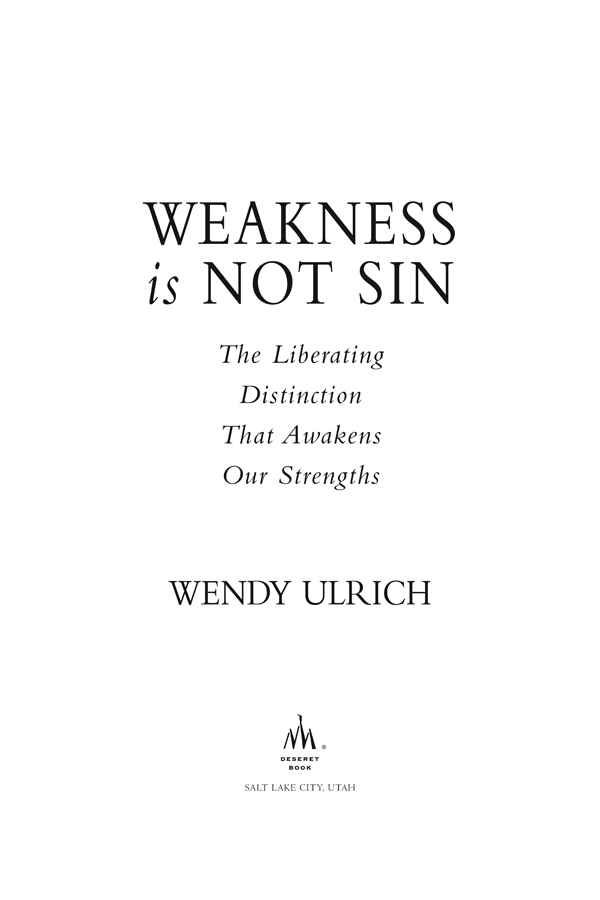2009 Wendy Ulrich.
All rights reserved. No part of this book may be reproduced in any form or by any means without permission in writing from the publisher, Deseret Book Company, P.O. Box 30178, Salt Lake City Utah 30178. This work is not an official publication of The Church of Jesus Christ of Latter-day Saints. The views expressed herein are the responsibility of the author and do not necessarily represent the position of the Church or of Deseret Book. Deseret Book is a registered trademark of Deseret Book Company.
Ulrich, Wendy.
Weakness is not sin: the liberating distinction that awakens our
strengths / Wendy L. Ulrich.
p. cm.
Includesbibliographical references and index.
ISBN978-1-60641-139-1 (paperbound)
1. CharacterReligiousaspectsChurch of Jesus Christ of Latter-day
Saints. 2. Self-actualization(Psychology)Church of Jesus Christ of
Latter-daySaints. 3. Christian lifeMormonauthors. I. Title.
BX8656.U47 2009
248.4dc22
2009018672
Printed in the United States ofAmerica
Publishers Printing, Salt LakeCity, UT
10 9 8 7 6 5 4 3 2 1
My grace is sufficient for thee:
for my strength is made perfect inweakness.
2 Corinthians 12:9
For my father, Les Woolsey,
and my father-in-law, RichardUlrich.
We miss you.
Chapter 1
* * *
Learning from Weakness, Living from Strength
This book is based on two very simpleideas:
Weakness and sin are very different.
Weakness and strength are not.
Although these ideas are grounded in the scriptures, theyrun counter to the way we often think. And the way we often think can interferewith our peace, our progress, and our relationship with God.
I never gave much thought to the difference between sin andweakness until recently. I assumed that weakness and sin differed only indegree of seriousness. I heard people pray, Heavenly Father, forgive us forour sins and weaknesses, and I also lumped the two together without a secondthought. Along with most Latter-day Saints, I assumed that sin andweakness were simply different-sized stains on the dirty clothes Iwear, different amounts of my indebtedness to the mercy of God.
I also assumed weakness and strength wereoppositesthat just makes sense, doesnt it? Or does it?
Have you ever noticed that some weaknesses can be seeds ofgreat spiritual power? Or how often a persons life mission emerges from thestrengths and gifts God develops from their weakness? As I have reflected onthese possibilities I have realized that weakness and strength are not alwaysopposites, and weaknesses are not always negative. Scriptural teachings seem toconfirm this possibility, as when the apostle Paul writes, When I am weak,then am I strong (2 Corinthians 12:10).
While some of us are overconfident of our strength andrighteousness when in fact we have a lot of work to do, I believe many goodLatter-day Saints dont get how good they really are. Ive come tobelieve that not understanding the difference between sin and weakness or therelationship between weakness and strength can fuel this chronic feeling ofinsufficiency. We can find evidence of our insufficiency everywhereinlast weeks uninspiring (or nonexistent) family home evening lesson,yesterdays missed deadline, or this mornings impatience with a fellowcommuter. We tune out the sacrament meeting speaker who glows about familyhistory because family history is just one item on a long list of our neglectedvirtuesa list we cant imagine ever fully tackling, a listalways standing between us and the Lord. We make New Years resolutions to chipaway at some weakness and then make the same resolutions a year later, and a yearlater, wondering how long God will put up with us. We berate ourselves for ourless-then-stellar Sunday School lesson, our annoyance with ourchildren, our lackluster prayers, our fifteen extra pounds, our irritabilitywith coworkers, our messy garage, our lack of professional development and takeit as a given that Gods reaction to these sins and weaknesses would bedisappointment, even anger, for our lack of commitment, charity, obedience, orsacrifice. We contemplate longingly how much better our lives would be if wecould just get rid of those pesky weaknesses that undermine our strengths andseparate us from God.
We also get stuck on the question, Do you consider yourselfworthy in every way to enter the temple? We know what the answer to thisquestion is supposed to be, but we wonder how anyone could ever feel worthy inevery way to enter a place where no unclean thing shall be permitted to come(D&C 109:20). We wonder, What does it take to be worthy? How far down thelist of my shortcomings must I go, how many of my failings must I overcome, tobe considered clean? If God cannot look upon sin with the least degree ofallowance, what must He think of me? I have so far to go.
We dont just think such thoughts because we lackself-esteem or self-discipline. We may think this waybecause we mistakenly lump sin and weakness together and assume that guilt andshame are the appropriate response to both.
I have come to believe that my quandary about these thingshas been based on a mistaken assumptionthe mistaken assumptionthat weakness is sin. As I have carefully considered the Lords teachings aboutsin and weakness, a different assumption has taken shape in my mind and heartabout how God views these two human conditions. With that changed view has comeclarity about how weak and fallen mortals can still be clean, worthy, andwelcome in Gods presence.
Let me reiterate this alternative premise: sin and weaknessare very different. They have different origins and different consequences,call for different remedies, evoke different responses from heaven, reside indifferent aspects of our being, and produce different effects. Sin can take usto hell. Weakness can take us to heaven.
Sin makes us unworthy to enter Gods presence, temple, andkingdom. Sin creates a big problem with eternal consequences. Sin alienates usfrom ourselves, from the people we sin against, and from our God, who cannotlook upon sin with the least degree of allowance. Sin is a choice to followSatan, the adversary and deceiver. No matter how strong we become, ourspiritual progress and joythe purposes ofmortalitywill grind to an absolute halt unless we repent ofour sins. As long as we are in a state of sin we can never be worthy to enterGods presence. But through the Atonement of Jesus Christ and subsequent to ourrepentance, we can be clean from sin.Here. Now.
In contrast, our weakness may make us wince at our folly orembarrass our children, but it does not in itself make us unclean. Weakness isin fact a big part of what we came to mortality to experience and somethingfrom which we have much to learn. Weakness is inevitable. Weakness may alsohurt those we love, cause us significant problems, and call us to regret,apologies, and hard work, but weakness does not have to alienate us from ourFather in Heaven. We will never get rid of all our weakness in this life, but Gods grace can make weak things becomestrongalthough not always in the ways we anticipate. His grace issufficient for all men that humble themselves before [Him] (Ether 12:27).Ultimately Gods capacity to make weak things become strong is perhaps His mostwondrous and distinguishing act of creativity, genius, and love.
Ive come to conclude that weakness can actually contributeenormously to our spiritual progress and joy if we respond to it with humility and the ability to learn. Greatstrengths can come out of weakness. Such strengths are grounded in the lessons,perspectives, and virtues we can gain as we turn to God with our limitations,pain, disease, struggle, and affliction. The spiritual gifts, talents, andcharacter virtues worthy of our most concerted effort and energy can emergefrom our experience with mortal weakness. Our personal mission includes thecallings, causes, and relationships through which we contribute these strengthsto the world.

